#arthur and john as the dies irae
Explore tagged Tumblr posts
Text

The Dies Irae—
It is your title, your combined force—
The Day of Wrath.
#been chewing on this line since i listened to ep 42#arthur and john as the day of wrath#the bearers of divine righteousness and fury#moving with reckless destruction#arthur and john as the dies irae#the omens of death and devastation#cannot help but bring pain with them wherever they go#uhh yeah#themes and symbolism and such#malevolent#malevolent podcast#malevolent fanart#arthur lester#john doe#john doe malevolent#cherrys art
81 notes
·
View notes
Text
Arthur and John each have a moment in the narrative where one perform a "leap of faith" and the other saves them. Both moments are quite interesting and serve to help the characters realise thay are no longer alone and that they can truly rely on one another (full analysis here, if you're interested).
However, I think there is a third "leap of faith" that occurs way later on... however this time the focus is neither John or Arthur, instead the character being saved is Noel.
Just like Arthur and John, the detective was forced to learn to be independent and self-reliant to ensure his own survival. He was separated very abruptly, and subsequently lost his only friend before being stuck in the Dreamlands. He was completely on his own against the King in Yellow, who tortured him relentlessly and cruelly for months. Noel was then carelessly spit back out in Arkham, traumatised and alone, and had to rebuild his life back up without being able to rely on anyone else.
How could he ever hope to explain all the horrors he was subjected to when no one could ever even begin to understand half of what he had to endure?
But then, years later he meets John and Arthur, and it seems that they can and do understand him. Noel allows Arthur to share his experiences in the Dreamlands... and the detective allows himself to finally recount his story too.
Then, in Part 40, Noel infiltrated a cultist base with John and Arthur and everything goes sideways. His trust in the characters is momentarily broken when John's real identity is revealed to him. Noel is then weakened by reliving his experience in the Dreamlands and nearly loses himself as the King in Yellow once again controls his mind and nearly kills him...
Noel takes a leap:
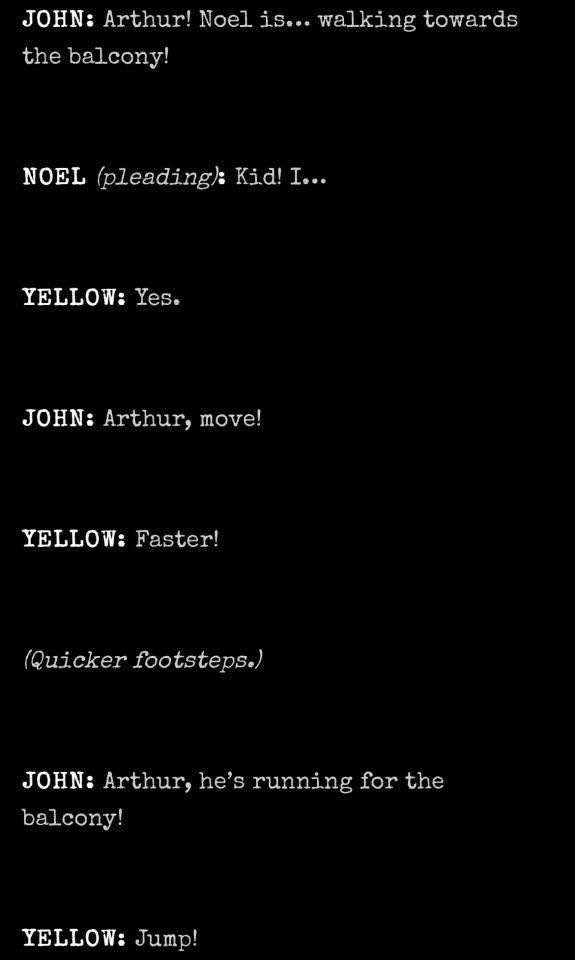
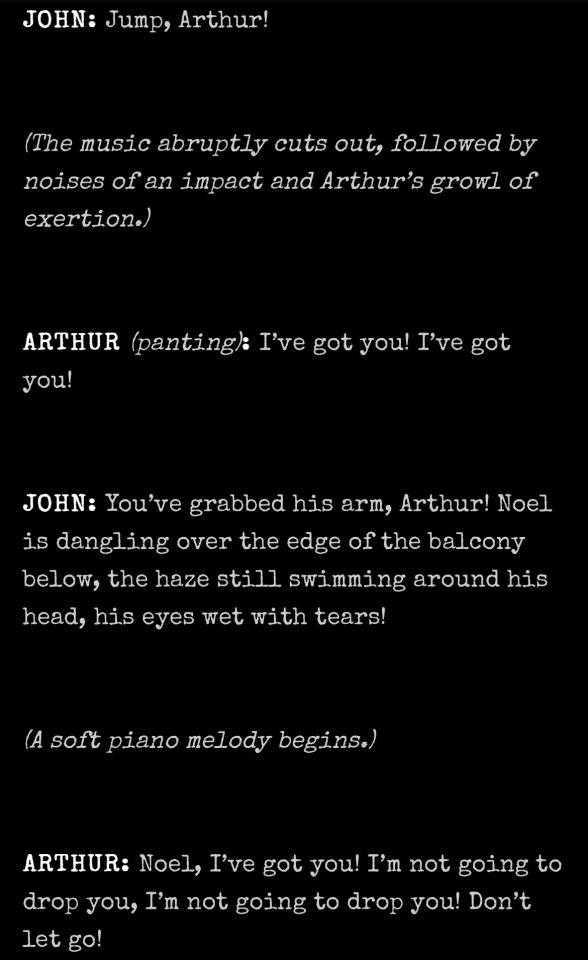
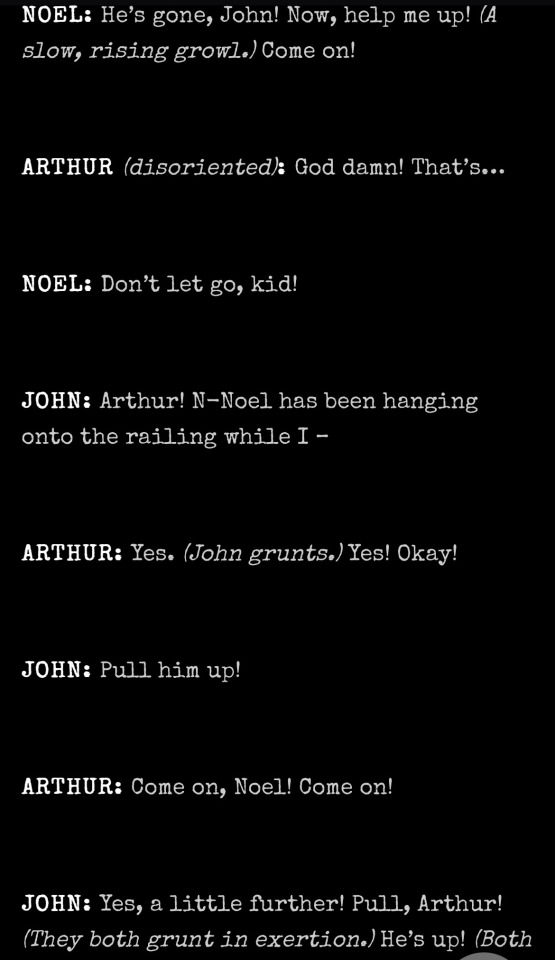
Noel was the first character that not only knew about Arthur and John's sharing a body situation, but also the first that wholly accepted them and tried to understand them better. It's only right that both Arthur and John reached out to help him and save him when he nearly lost himself.
As a side note, I think it’s really interesting how Arthur kept calling him out using his real name (Charlie), while John tried to reach him using his chosen name (Noel) during this scene. It's such an excellent, little detail which I really enjoyed.
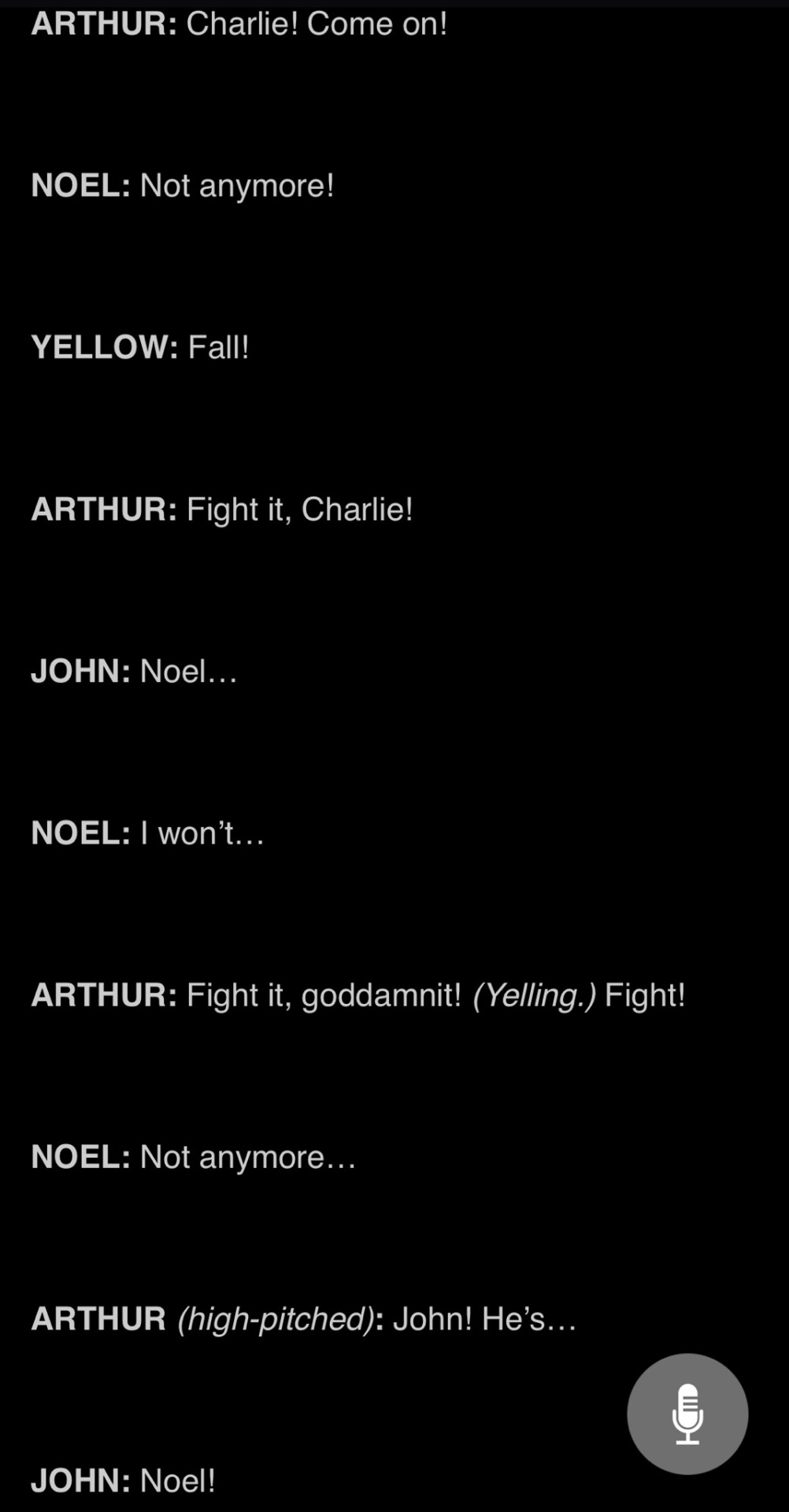
I like to think that the use of both names is because just as Charlie/ Noel accepted both John and Arthur both as a unit and as separate people, the two characters are doing the same by accepting and recognising both the detective’s (past and present) identities as well. They decide to accept and save any and all versions of Charlie/ Noel.
Of course this is not the only interpretation. For example, the use of one name or the other might reflect how John and Arthur are recognising core parts of themselves within Noel/ Charlie instead.
John is calling the detective by his chosen name because he is honouring Noel's choice to start anew. Noel had been hurt in every possible way and reduced to nothing after his experience in the Dreamlands. The detective found that the only way to move forwards was by leaving all the (too far) damaged parts of himself behind and try to create a new self. A clean slate and new name for a new beginning to start a better life somewhere new. He needed to leave his past behind and forget the parts of himself he didn't want anymore. That was what John did too when he dissociated from the King in Yellow and began forming his own identity.
On the other hand, Arthur is calling the detective by his real name because he is honouring the person Charlie was in the past. Charlie was the part of himself that he left behind because he deemed too damaged and too ugly to salvage. Arthur drags behind his past mistakes like deadweight, he carries all the guilt and sorrow with him wherever he goes. He wants to believe that all the hurt, all the damage and all the scars he deems as the ugliest parts of himself don't make him an utterly repulsive and unlovable monster. I think he is trying to demonstrate that Charlie is just as worthy of being saved as Noel is, weaknesses and broken parts included.
Hm, and I seem to have gone off a giant tangent here... I shall stop blabbering now before I completely lose track of what this analysis was supposed to be about.
#malevolent#malevolent spoilers#malevolent part 40#arthur lester#john doe#charlie dowd#noel finley#detective noel#and now i am just going to be a little silly in the tags. so pardon me for my nonsense:#arthur and john are given the name dies irae and this title implies their decision to either save or condemn other characters-#is absolute and just. so if we take into account that they BOTH made the conscious decision to reach out and SAVE noel...#maybe i am just delusional but it wouldn't make sense for the detective to die right after this scene#SO what i am trying to say is that noel survived the gunshot wound to the neck and did not die at the end of s4. in this essay i will--
109 notes
·
View notes
Text
Malevolent 42


#malevolent 42#malevolent#malevolent spoilers#arthur lester#john doe#yorick#THAT EPISODE#real talk though yorick was CREEPY AF and the MUSIC during his bits was FANTASTIC#ALSO HE CALLED ARTHUR THE DIES IRAE???????? OMG
135 notes
·
View notes
Text
Dies Irae
I am so sorry but i did a deep dive on the Dies Irae because of the last malevolent episode and now its gonna be all of you's problem.
one of the oldest and most frequently borrowed of all melodies is the ecclesiastical plainsong to the sequence 'Dies Irae', because of the theme's intrinsic merit, but also its liturgical associations. No record of its origin remains, but both words and melody appear to have been suggested by a passage from the Respond ' Libera me, Domine', which follows the Requiem Mass (catholic mass for the dead) on solemn occasion.
SOURCE: Gregory, R. (1953). “Dies Irae.” http://www.jstor.org/stable/730837
the Requiem Mass contained several special components; the Dies Irae was one of these, formally added to the Mass in 1570. Its text was penned by Thomas of Celano during the late 11th or early 12th century, and it offers a graphic depiction of the horrors of Judgment Day for sinners. the New Catholic Encyclopedia states that
"The medieval Sequence stresses fear of judgment and condemnation."
SOURCE: Brooks, E. (2003). "The Dies Irae ("Day of Wrath") and Totentanz ("Dance of Death"): Medieval Themes Revisited in 19th Century Music and Culture." https://scholarworks.uark.edu/inquiry/vol4/iss1/5

Centre panel from Memling's tryptich Last Judgment (c. 1467–1471)
the text contains three basic references:
(1) Zephaniah 1:15,16
That day is a day of wrath, a day of trouble and distress, a day of wasteness and desolation, a day of darkness and gloominess, a day of clouds and thick darkness, a day of the trumpet and alarm, against the fortified cities, and against the high battlements.
(2) II Peter 3:10-12
But the day of the Lord will come as a thief; in which the heavens shall pass away with a great noise, and the elements shall be dissolved with fervent heat, and the earth and the works that are therein shall be burned up. Seeing that these things are thus all to be dissolved, what manner of persons ought ye to be in all holy living and godliness, looking for and earnestly desiring the coming of the day of God, by reason of which the heavens being on fire shall be dissolved, and the elements shall melt with fervent heat?
(3) finally, the judgment portion of Matthew 25 is cited as part of the scriptural basis for the "Dies Irae."
THE TEXT, in an english translation from the original latin
Day of wrath and doom impending, David's word with Sibyl blending! Heaven and earth in ashes ending!
O, what fear man's bosom rendeth, When from heaven the Judge descendeth. On whose sentence all dependeth!
Wondrous sound the trumpet flingeth, Through earth's sepulchers it ringeth. All before the throne it bringeth.
Death is struck, and nature quaking, All creation is awaking. To its Judge an answer making.
Lo! the book exactly worded. Wherein all hath been recorded; Thence shall judgment be awarded.
When the Judge His seat attaineth, And each hidden deed arraigneth. Nothing unavenged remaineth.
What shall I, frail man, be pleading ? Who for me be interceding. When the just are mercy needing?
King of majesty tremendous, Who dost free salvation send us. Fount of pity, then befriend us!
Think, kind Jesus! my salvation Caused Thy wondrous Incarnation; Leave me not to reprobation.
Faint and weary Thou hast sought me. On the Cross of suffering bought me; Shall such grace be vainly brought me ?
Righteous Judge! for sin's pollution Grant Thy gift of absolution. Ere that day of retribution.
Guilty, now I pour my moaning. All my shame with anguish owning; Spare, O God, Thy suppliant groaning!
Through the sinful woman shriven. Through the dying thief forgiven. Thou to me a hope has given.
Worthless are my prayers and sighing. Yet, good Lord, in grace complying, Rescue me from fires undying.
With Thy favored sheep O place me, Nor among the goats abase me. But to Thy right hand upraise me.
While the wicked are confounded. Doomed to flames of woe unbounded. Call me with Thy Saints surrounded.
Low I kneel, with heart submission. Crushed to ashes in contrition; Help me in my last condition!
Ah! that day of tears and mourning! From the dust of earth returning, Man for judgment must prepare him;
Spare, O God, in mercy spare him! Lord all-pitying, Jesu Blest, Grant them Thine eternal rest.
the first six stanzas describe the Judgment. the other stanzas are lyric in character, expressing anguish of one of the multitude there present in spirit; his pleading before the Judge who, while on earth, sought him unceasingly over the hard and thorny ways from Bethlehem to Calvary; and now, in anticipation of the Judgment, pleads before a Savior of infinite mercy, who, on Judgment Day, will be a Judge of infinite justice, before whom scarcely the just will be secure.
SOURCE: Demaray, D. E. (1965). "Thomas of Celano and the" Dies Irae". https://place.asburyseminary.edu/cgi/viewcontent.cgi?article=2018&context=asburyjournal
#idk i just like doing research and i thought i might just do a service for the community#i love you all malevolent mutuals and malevolent people btw#dies irae#malevolent#malevolent 44#malevolent spoilers#arthur lester#john malevolent#blackmetalbats
47 notes
·
View notes
Text
i can't wait for dies irae. i love wrath.
#genuinely my favourite sin#perhaps it's not a literal day. but. i really hope arthur just gets to go apeshit#malevolent#arthur lester#john doe malevolent#dies irae#day of wrath
35 notes
·
View notes
Note
Yorick is so interesting to me. Just like first of all its thing seems to be it can see through people's eyes? And John is Arthur's eyes.
Yorick's vast knowledge combined with its mechanics gives a bit of a sassy vibe. It definitely gives me a "greater picture character" with it telling them about the talisman and saying (or implying) that it will indirectly help with finding the black thingy and then literally leading, to what Yorick atleast seems to believe to be an unavoidable, doom fate for arthur (he'll get better 🙄) We definitely already saw some od the dangers of trying to use it this episode but it's helpful.
Its definitely a pushingly devoted servand type character, referring to Arthur as "my master' and John as "my king" and insisting on a name for an identity perfectly fitted to be what they want. It has Arthur and John on pretty equal footing in terms of loyalty instead of only serving one of them, saying it serves "the dies irae" their "combined force"
"Gently please" when arthur had to put it down was pretty cute.
I think Yorick is vying for a top three spot in my favorite malevolent characters with Kellin rn. His skeleton charm and um actually personality have captivated me
#(I do not count Arthur or John as part of that list that'd be unfair)#Obviously we know the vanguard is a powerful entity but I'm curious as to what (serious) danger is actually elicited by it#Yorick is too useful to just be another convenient lantern#but I'd bet on him somehow drawing the attention of something else when he gets information as the risk associated with using him#What I want to know is why when Yorick was Samantha it only addressed Arthur#It's firstly weird that it was addressing Arthur as 'master' then but at that point the head was theirs so fair enough#but John couldn't even hear the vanguard#Who was it serving? Kellin ??#Does giving it a mouth change the entity its serving?#And did that entity change from Arthur to the Dies Irae or *something else* to the Dies Irae#Is he still serving someone else now?
2 notes
·
View notes
Text
Ok - I'm not an expert on religion. But I'm a classical musician and Harlan 100% knows and intends the music associations. Dies Irae is a part of the requiem: the mass for the dead or the funeral mass. Dies Irae is traditionally funeral music.
The version in the movies is the gregorian chant that sounds like this. Dies irae quotes and motives in movies are associated with death, impending doom or something grim. It's used in soooo many movies of all genres. Some examples:

Gregorian chant aside - in different requiems by different composers there are different versions of Dies Irea. The two most famous are Mozart's and Verdi's. The text, however, remains the same:

Dies Irae means Day of Wrath - it's the Last Judgement (in my mother tongue we say Day of Doom). Basically the end of the world.
My associations when I heard 'dies irae' on Malevolent was: are they gonna bring about the fucking end of the world!?
I also cannot stop thinking about what the implications are - if Arthur and John have the title Dies Irae, are there other titles? Maybe other parts of the requiem mass like Lux Aeterna (perpetual light)!???
Anyway I'm rambling - if you want to know more about the music go here, read the full dies irae text here (in a requiem it's is divided into smaller parts).
Malevolent fans can we talk about how John and Arthurs collective title is The Dies Irae and how fucking hot that is, like please direct me to peoples rants or just fucking go off here cause babygirl I need to eat this symbolism/foreshadowing with a fork and knife
#malevolent#john doe#arthur lester#dies irae#classical music#i have so many thoughts on this#i cannot wait to find out what is going on#if someone knows more please enlighten me
83 notes
·
View notes
Text
Hey Yorick, buddy, quick question. Why did you call Arthur and John the "Dies Irae"? I didn't catch it the first time but I did just now and it's killing me. It means Day of Wrath Yorick. Fucking Judgment Day. Why is that their title Yorick?? What the fuck does that MEAN???
#malevolent#arthur lester#john malevolent#yorick malevolent#im dying#how did i not catch that last time#lmao what the hell is this supposed to mean?
350 notes
·
View notes
Text
I can't believe (that's a lie, I totally believe) that right as John and Arthur are finally settling into what feels like what could be their best communicative era of all time, growing and self realizing and listening and forgiving and *loving*, Yorick whips out the Dies Irae title and tells them "That'll apply to you later."
Um. NO. NO IT WILL NOT. THEY WILL NOT BECOME GODS OF WRATH AND THEY WILL GET TO BECOME BETTER PEOPLE, BETTER HUMANS, NOT ENTITIES, NOT MONSTERS
Guys they deserve better, they deserve to settle down, to make it out, to not be consumed by the Lovecraftian genre. I know they've done wrong but they want to change and I want them to be able to change, not to be forced into a future known as The Day of Wrath
79 notes
·
View notes
Text
Trying to remember how many bullets Arthur and John still have in the gun and starting to worry about Dies Irae being them loosing the shit and shooting the rest of the Castle Crew....
44 notes
·
View notes
Text
As a music, religion, and literature nerd, the Dies Irae has been one of my favorite go-to pieces of trivia for a long time, which means that this line:
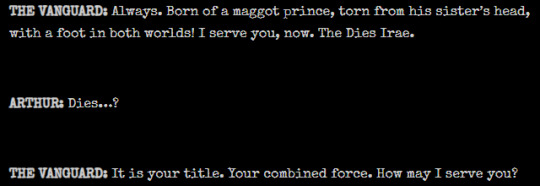
Has been driving me batshit BONKERS since part 42! And also as a semi-professional media analysis yapper, I figured I might as well dive into the exact reasons I jumped up and audibly gasped upon first hearing this line and have subsequently lost my mind since then. So!
Here is why I think that the Dies Irae is the perfect analogy for John and Arthur:
Religion
Let's start with the most straightforward meaning: "Dies Irae" is a Latin term, and it translates to the "Day of Wrath." Or otherwise known as the Judgement Day, the foretold second coming in Catholic canon, when Christ will "come again in glory to judge the living and the dead." It's at this Last Judgement where God will wield perfect justice to send the worthy to everlasting peace and the unworthy to everlasting punishment. (everyone say "thank you" to excessive childhood Catholic lessons for burning this into my brain)
There's a kind of irony to the fact that Arthur so vehemently rejects Christianity and religion as a whole, and that John spends much of his arc trying to distance himself from the role/identity of a god, yet both are given this incredibly religious title, effectively restricting them from ever forgetting the presence/influence of religion in their lives.
This title has a couple layers though, because we have to consider why it's the Day of Wrath specifically that represents Arthur and John. Now, I don't think I have to tell you that those two are bursting with anger 80% of the time. But I am going to tell you that those two are not just angry, but moreso "divine fury" incarnate.
The Day of Wrath, the Final Judgment, is the final and eternal judgment of God on all: "For now before the Judge severe / all hidden things must plain appear; / no crime can pass unpunished here." (Dies Irae, Dies Illa). The final Judge, the all-powerful God, can see the objective morality of every single person, and is thus the sole, rightful determiner of fate.
This assumption of their right to perfectly and single-handedly decide others' worthiness shows up over and over, not just John and Arthur's actions, but also in how they describe these judgments.
When Arthur kills the widow on the island, it's not because she was dangerous, but because she was a cultist who "deserved" to be punished.

When John and Arthur need to get rid of Mr. Scratch's stone, John says they should give it to "criminals" who are "deserving of this curse." Even though, just moments before, Arthur refused to give the stone to Oscar because to do so would be to cursing him to a fate of eternal suffering.

And I can't go into every single detail about the entire Larson plotline because this post would double in size, but it obviously needs to be included here. Possibly the strongest tie between this arc and the idea of the Dies Irae is Arthur's conviction through it all. Arthur vows that he is going to kill Larson in divine retribution not because he wants to, but because he has to. He even goes so far as to admit that killing Larson will be a mistake, a cruel and overly-bloodthirsty action that goes against his compassion. But killing Larson isn't a choice to Arthur, it is the unavoidable punishment for Larson's sins and Arthur is simply the enactor of justice. Just like the Final Judgment, there is no sympathy, no hesitancy— the judgment is absolute, divinely ordained, and cannot be stopped no matter how undeniably horrific it is.

If we look at the Catholic Catechism, principle 2302 states that it is sinful to kill out of desire, but that it is "praiseworthy to impose restitution" and use violence to "maintain justic." So even if Arthur has intent to kill, his actions count as divinely sanctioned. He is acting as the hand of God's punishment.

Over the course of Season 3 and 4, Arthur's fiery rage dies down to a more gentle simmer, but his conviction only seems to grow, and John follows suit. Despite previously reprimanding Arthur for his unquestioning wrath, John eventually becomes just as convinced that Larson "deserves" to face a wrathful reckoning. The "fact" that Larson is wholly unforgivable and is fated to receive eternal punishment becomes more indisputable in their minds, and they both stop questioning the morality of their intentions, entirely convinced of their judgment.
Throughout the story, Arthur and John insist upon the importance of kindness, compassion, and forgiveness, and say that these are the values that guide their every action. Yet, time and time again, they approach certain people with nothing but wrath and resentment. It's a sharp contrast to the benevolent figures they make themselves out to be, and Arthur and John are often blind to the contradiction because, in their eyes, they are still following those values in every action. And in the moments when they do recognize their horrific words or actions, they still cannot let their judgment go, convinced that it is their "duty" either way.
In Part 35, Arthur says "Just because you can't make the hard decision, doesn't mean it's wrong." This is exactly how John and Arthur view themselves. They know that some of their actions are harsh and violent and painful, but they are don't view that violence as wrong, because they are enacting that violence in justice. They move through life with carefully-selected destruction, culling the world of those they view as unforgivable sinners, and punishing them with divine righteousness. Arthur and John carry righteous fury in their every step, bringing the Day of Wrath down upon the world around them.
Now, there's already a ton of meaning just in this religious allusion alone. However, there's another application of the Dies Irae in modern culture, which brings us to the second side of this title:
Music
Back in the 13th century (sounds like a familiar setting...), friar Thomas of Celano wrote a poem for and about the Dies Irae. The poem was recited at Requiem Mass (church services to honor the dead), and it ended up being set to a Gregorian chant tune.
Over time, this melody has been used by a variety of composers, but the one we're focused on is Hector Berlioz. In 1837, Berlioz used the Dies Irae melody as part of his narrative symphony, Grand Messe de morts, in order to communicate that the main character had died. Then a lot of other composers saw that and said "Hey that's a cool idea!", and started also using this melody to represent death in their music. Nowadays, it's a fairly staple part of modern film and musical storytelling. If you've listened to literally any major soundtrack, then there's a good chance you've heard this motif (or a variation of it) used before. It's often subtle, sometimes loud and obvious, but no matter what, it reveals the inevitable presence of death. (essentially, the Dies Irae=death)
Now, obviously there's something tragically ironic about Arthur being likened to a musical motif when he tries so hard to distance himself from it, and there's something tragically ironic about John being associated with such a dark piece of music when he shows so much fascination and joy toward the art. Again, though, we've got some layers here. Yorick doesn't just compare Arthur and John to the Dies Irae, he literally defines them as the Dies Irae, a full embodiment of it.
Even before the story started, Arthur lost both of his parents, his friend and wife, his daughter, and his best friend.

John, when he was part of the King in Yellow, knew only how to harm and attack. In the Dark World, he falls back on this fearful lashing out with violence, harming even more people.

And throughout the story, John and Arthur seem to bring devastation to everyone else around them: Lilly the buopoth, Oscar, Noel, Collins, Daniel, Larson and Yellow.
The arrival of Dies Irae musical motif in a film always indicates that death is approaching or that is has already struck— a host carrying its blight to spread onto others. Just like the musical motif, the arrival of Arthur and John foretells the near-arrival of death. They play a duet together— John and Arthur, and death— always singing and dancing around and with each other.
These two never succumb to death, always finding a way to slip through its fingers and survive every situation. But they cannot escape death's presence because they are death's partner— singing the melody to death's subtle harmony. They cannot escape death because they are its host— destined to carry and spread devastation to death's victims. From the moment you meet John and Arthur, you know that death is inevitably approaching just a step behind, waiting to strike you down.
Whether it's the religious or musical side, we can see that John and Arthur are the literal embodiment of these allusions. They carry these powers and ideas in their every action and word, in their every step, in their very breath and blood.
Arthur and John. The hands of God's justice. The enactors of divine fury.
Arthur and John. The hosts of blight and destruction. The partner of death's song.
The man himself. The voice inside his head.
The Day of Wrath. The Dies Irae.
#this is late. like. really late#and canon is clearly lining up for an actual plot point related to this title#but ignore that!#and just think about the themes guys. the allusions. the symbolismmmm#(humor me here)#also i am. so sorry. for basically posting an entire informal essay#that appeals specifically to just me. and maybe two other people in the whole world#but the worms in my brain demanded that i yap about this#malevolent#malevolent podcast#malevolent analysis#malevolent meta#dies irae#arthur lester#john doe#cherrys rambles
202 notes
·
View notes
Text
Malevolent said oooh you wanna think about death and time so bad 💀⏳


the Dies Irae, the Day of Wrath, an apocalyptic poem about Judgment Day once used in Catholic masses for the dead...

Kayne tells them to give the Vanguard a mouth, and it's Yorick who refers to John and Arthur as this.
the Dark World, meanwhile, is described as death for the undying...

death for John's kind? death for old gods and eldritch powers? because that's not where Arthur goes when he "dies" this latest time, and it may not be what he briefly experienced the first time, despite believing so - it's never confirmed, only assumed.
(the first time, he hears a voice that sounds like John's - the King in Yellow, in the Dreamlands? or something else going on - John from a different time, or a different reality, and time and space looping around in strange ways? Kayne has demonstrated a hint of that - Arthur hearing himself in other worlds, in the past - and they've started to jump around in time now. which was a given from the beginning - the Hounds of Tindalos were mentioned by name in Season 4, and that is the foul creature that pursued John and Arthur in the hospital in Season 1, the first time they touched a corpse to see its death. beasts inhabiting time's angles, who pursue those they detect traveling through time.)
Arthur has died and come back twice. John has been in the Dark World twice. (third time's the charm?)

John makes himself a kingdom in the Dark World, the second time. a kingdom of the dead? of dead gods and monsters? what was he feeding on?
Kayne claims to have killed all other versions of himself, of Nyarlathotep, and speaks gleefully about the permanent death of one of his own, about how that kind of death leaves behind power. which is like how the so-called Fallen Stars are depicted in the Order's paintings... something falling from a being.


and Arthur is compared directly to the Black Stone.

I don't believe the Black Stone will be as straightforward a MacGuffin as it seems. I think, in one way or another, it's something that came from Arthur and John themselves - from the Arthur and John of other realities, and/or from their travels in time. it may have something to do with the Dark World, because John has been trapped there, and Arthur has died-but-not-really, and they are dripping with death motifs at this point.
death is not used or treated lightly in this story. it hovers over the narrative like a storm cloud (Faroe), and it's a visceral tool to drive home an emotion and a theme ("Lily") or a point about incredible danger (the Butcher). and now death has been presented as a possible engine of power.
after all, destruction and decay are necessary for life to exist and continue - the explosive deaths of stars scattering foundational elements, decomposition feeding the carbon cycle. existence and life as we know it is only possible because of entropy - the relentless forward motion of the arrow of time, allowing energy to be usable, guaranteeing a past and future.
but Kayne has found a way to play the strings of many worlds at once, to cut through time and space in whatever direction he pleases. he is clearly looking to go further than he already has.
and if the arrow of time changes direction, is reversed or bent out of shape... what happens then?*
*the fucking dogs come out to get you. I want to see my little boy (here he comes)
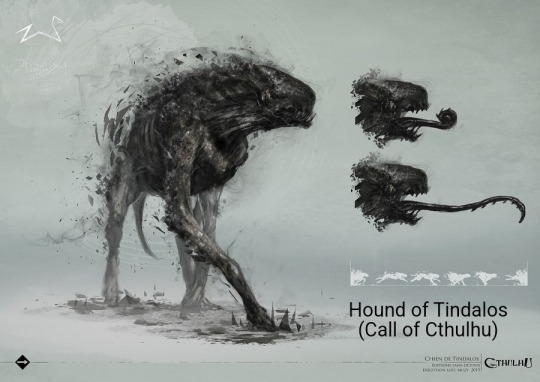
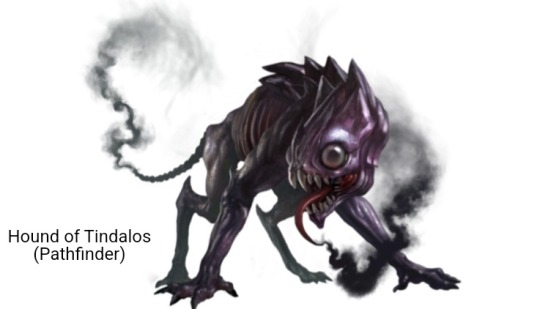
32 notes
·
View notes
Text
OK MY RANDOM YOUTUBE KNOWLEDGE FINALLY NEEDED
DIES IRAE is a Catholic sequence, a hymn-type thing, singing about the judge (Jesus) who will come one day, on this dies irae or "day of wrath" and kinda fix everything. In it, the character sings about the hope for forgiveness
JESUS ARTHUR CANON LOL
That is, probably not quite. Dies irae is exactly the day. A moment, if you will allow me, if it was meant here, I believe that iudex would be used, which is literally translated, or perhaps Rex tremendae majestatis "King of terrifying will" which are both in this work.
Maybe I'm boring, but it's interesting. Because the song, although it is called wrath, is not really about that, it is about how cool Jesus is, and how he lived for people's sins, and how tired he is etc
What is more interesting, this title in the context of the show can mean both that Arthur and John judges in the context of the song, and that they are the one who sings, AND THAT they occupy both roles separately. Where I assume Arthur is one who judging and John is who been judged
It may look strange, but it makes more sense to them than the other way around. Yes, John is (part of) a God in this world, but it is Arthur who is more suitable for the one who "suffered for sins" and John is clearly the one who is still feels guilty of Arthur (for Arthur it isn't John but Frao)
I'm ready to fight for it with knives. Fuck the metaphor of God kneeling before a mortal and begging for forgiveness is SO FUCKING GOOD
[It is translation of my Ukr-language post, which I made while listening to the episode in parallel, so it may contain inaccuracies and just look strange, sorry]
#malevolent pod#malevolent podcast#malevolent arthur#john doe malevolent#malevolent#malevolent 44#malevolent theory
62 notes
·
View notes
Text
guys! guys! i LOVE shitposting and making memes about malevolent, but! we need to talk about two things from the last ep
1
this is probably a minor thing? but i loved all the allusions to giving birth. we have arhtur mpreg from last episode (lmao) we have the title of the episode (deliverance) we have arthur "being born again", or being resurrected from the dead and we have the scene of them going underwater, and then resurfacing "outside". i really liked it and it might come up again idk
2
DIES IRAE??????
Yorick calls the "combined force" of John and Arthur as Dies Irae. that is a medieval latin sequence that describes judgment day (i.e. the last day of the apocalypse in the christian scriptures). and it particularly describes the trumpets of god separating the saved and the unsaved.
the saved will be delivered (sounds familiar?) and the unsaved will be cast into eternal flames (the dark world?)
im so intrigued and i want to see where this is going to go, but i have a feeling that it is going to be resolved in season 6, as like the finale of the whole series, and Harlan is just mentioning it now to spread some seeds that he can collect later
i am so gonna make another post about this
#many many thoughts#malevolent#malevolent 44#malevolent spoilers#arthur lester#john malevolent#yorick malevolent#malevolent podcast#blackmetalbats yaps
51 notes
·
View notes
Text
I'm Cataloging Every Occurrence of the Piano in Malevolent in a Spreadsheet for Leitmotif Analysis. No, I'm Not Kidding.
As the title of this post reads, I've spent the last few weeks listening to every episode of Malevolent and logging every time the piano is heard (both within the story and as background score), to analyze the data for leitmotif/music based theory-crafting. I originally was planning on getting through the entire series before posting anything, but I am very quickly realizing that this is going to take me a while, and I start a new semester in two weeks, so there is a high likelihood I will not finish before I get too busy to chug through as many episodes a day as I am now. I'm on episode 16/44 and I've already logged 137 instances of piano music. I'm not even halfway done. And this is all I've been doing for the past multiple days. For this reason, I've decided to post the link to the spreadsheet before finishing.
If you're familiar with Malevolent, and just how much music is in it, you might be asking, "OP, are you utterly fucking insane?" And well, dear reader, the answer to that is probably yes, but while you might call it madness, I call it love. So, before getting into the meat of things, I wanted to explain why I even decided to do this. Spoilers ahead for Malevolent (obvious, but yeah). If you don't give a single shit about why I did this and want to get straight to the sheet, scroll to the bottom for the link.
So. About 2 weeks ago I finished my first listen-through of Malevolent. One thing about the most recent episodes struck me as very very significant: John and Arthur's "collective force" being titled as the Dies Irae.
Now, a full-bodied explanation of why I find this so important and the possible implications will come at a later date, but long story short, the Dies Irae is a very significant piece of musical literature-- it is, perhaps, the most commonly quoted leitmotif of the past 800 years, and it symbolizes death. So, understandably, the Themes of this kinda sent me down a spiral.
But the Dies Irae being mentioned in such a way also got me thinking: music is a pretty integral part of Malevolent. So, is the Dies Irae quoted anywhere in its soundtrack? I suddenly got very very excited at this prospect, particularly if it might be in Faroe's Song, because well... god that would hurt lol. I scoured the available songs on the bandcamp aaaaand... no luck (as far as I can tell). Regardless, even if the Dies Irae wasn't a part of the soundtrack, I became curious about what kind of leitmotifs were in the podcast, and what they might mean. And so, the spreadsheet was born.
I explain this in the User Guide part of the sheet (please read it before going through the rest btw), but I only track the piano parts of the podcast. The reason for this is two-fold:
First, score wise, piano is very easy for me to pick apart, and I don't see a lot of significance in the suspenseful string music for horror moments (though I don't deny there might be something to it, I simply won't be able to find it.) To me, the piano is also significantly more important than the strings because it's a notable part of the story-- Arthur and his relation to the instrument is a key part of the plot, and multiple of the piano compositions are made by him. For this reason, I found tracking the piano in the podcast worthwhile.
Second, I also don't touch any of the non-original radio tracks in the podcast (i.e. You Call It Madness (I Call It Love)) because this video by The Final Fantasmagorie already does an excellent job of covering them (please check it out!!), and I felt it would be redundant, especially considering the astronomical amount of ground I already have to cover. If these tracks start being featured as leitmotifs in the piano music then... well, I might change my mind, but so far, no dice.
If I noticed a non-piano piece of music (such as the wraith humming in Ep3) that I haven't found any analysis of whatsoever, I also noted it just so there was some record. Other than that, just piano tracks.
Explanations and disclaimers out of the way, here is the link to the spreadsheet. I might open it up to comments and/or editors at some point, but for now, it's just available to viewers. Once again, please read the disclaimer and user guide before the rest of the sheets.
Thanks for reading, I know this was a very long post, and I appreciate it if you've beared with me! Enjoy!
#malevolent podcast#malevolent#malevolent theory#malevolent spoilers#arthur lester#john doe malevolent#john doe#arthur lester malevolent
40 notes
·
View notes
Text
Okay so like. Lots happened and I cried but. Mallam. (Spoilers for Malevolent Part 45 “The Fire”)
Let’s go over some Mallam characteristics hm?
- Two different colored eyes
- Missing right ear
-Greying hair; wispy grey beard
-two parallel scars on face
-dark complexion
Listen I’m just a bit suspicious of how similar some of these injuries are; alongside how he says “in your journey towards our day of wrath” which is a CLEAR reference to Arthur and John’s title as the Dies Irae. And the different colored eyes? This person seems like some…combination. A potential of Arthur and John, something they do become in some world. Maybe an Arthur who… dies? Becomes less than, and it’s more of John’s body than Arthur’s? Perhaps because of the whole ‘I did not expect you to welcome me’, (and he had just encountered, perhaps, another potential Arthur but that’s a whole other post) but it just. Speaks of someone who knows things but had a different experience.
And it fits, right, as an ending for them? To become a sort of deity, embodying the wrath of dead children and recognizing their light and hope?
(It could even be a John who ended up in someone else, and there’s no Arthur at all, just another world where things fell a different way and this is how things ended up.)
Also also, Harlan voices this character in a way that’s more similar to John’s voice than any other voice we’ve heard so far. It’s less distorted, and more measured and deliberate, but I could easily see it as a John, an older one with more experience and different pains.
Or it could be someone totally different. I’m not totally sold on this theory. But I’m tossing it about, we’ll see what develops.
42 notes
·
View notes